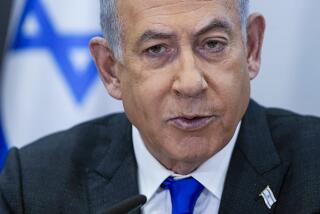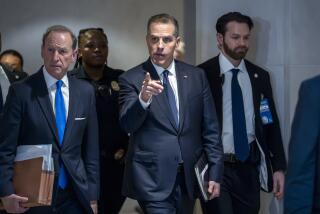N. Korea to Resume Contacts With U.S.
WASHINGTON — North Korea has accepted a U.S. invitation to hold talks on curbing its missile program and military exports, the White House said Tuesday.
“We anticipate these talks will begin,” Press Secretary Ari Fleischer told reporters in California. “The United States will work to determine the timing and other details in the coming days.”
President Bush had proposed talks “without preconditions” between the two governments in June, but until now North Korean leader Kim Jong Il had ignored the invitation.
The possibility of such talks seemed remote after Bush, in his State of the Union address in January, labeled North Korea part of an “axis of evil” whose aspirations to develop and possibly spread weapons of mass destruction loomed as a global menace.
But in recent months, the reclusive Asian nation has noticeably opened up to the outside, hosting several prominent visitors, including Indonesian President Megawati Sukarnoputri and Donald P. Gregg, a former U.S. ambassador to South Korea.
North Korea’s agreement to resume direct contacts with Washington was not unexpected; the Communist regime had indicated during a recent meeting with a South Korean envoy that it was interested in doing so. But the Bush administration withheld comment until it heard directly from the North.
The likely U.S. representative to the talks will be Jack Pritchard, a State Department expert on the Korean peninsula, officials said.
It was unclear where the meetings will take place. The North Korean offer, conveyed to the State Department by the regime’s mission at the United Nations, suggested Pyongyang, the North’s capital. Fleischer made no reference to the site.
A resumption of direct dialogue between the U.S. and the North may bode well for South Korean President Kim Dae Jung’s nearly moribund “sunshine policy” of engagement.
Hopes of a rapprochement had soared after Kim’s historic trip to Pyongyang in June 2000, but the two sides have made little progress since.
Plagued by years of famine and increasingly desperate for hard currency, North Korea could reap economic benefits from the U.S. in exchange for curbing its development and export of weapons of mass destruction.
The last official and high-ranking U.S.-North Korean contact was in October 2000, when then-Secretary of State Madeleine Albright visited Pyongyang. Those talks focused on North Korea curbing its weapons proliferation program in exchange for two light-water nuclear reactors.
More to Read
Sign up for Essential California
The most important California stories and recommendations in your inbox every morning.
You may occasionally receive promotional content from the Los Angeles Times.










